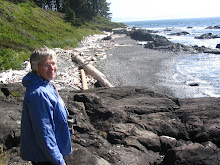 Image via Wikipedia
Image via Wikipedia
A study was carried out in a psychology class at a university. (Carter, 2009) A control group of students listened to a live half hour lecture while another group of students used a podcast of the same information. The students with the podcast scored higher marks on a test on the material. Students watched the podcast which was actually a vodcast. They could pause and rewind as often as they liked. It was observed that those students who took notes as they watched the vodcast did the best. If listening or watching was simply passive, there was no observable advantage to the vodcast over the live lecture.
Some students suggested that it would be best to record the live lecture and attend it in person so that you could simply listen and absorb information. Then later one could listen to and pause and rewind ones way through the podcast recording again.
Another student said that it doesn't seem right to use 21st century technology to continue using a 19th century teaching style--the lecture. This is where my image comes in, of putting the same old wine (the lecture) in new wineskins (Web 2.0 tools).
I recognize that podcasts can be used in very creative ways. Podcasts may be produced by teachers and students. A radio show could be created. It could be a weekly production which parents could download at home to learn about class news and learning projects. There was an example given of students who read poems on a podcast. Parents and others commented on the individual poems. Students could interview senior citizens or soldiers for Remembrance Day services or history projects. Teachers could narrate labs or the methods for an art class. Then students could follow along step by step with the narration and only ask for help if they are stuck. School divisions could promote the schools in their district through podcasts for each school. When a parent clicked on the name of the school on the city map, the principal would narrate a brief description of the school. All of these are ways in which students and teachers can create their own podcasts for various purposes.
Students and teachers may listen to podcasts. This would be the receptive use of podcasts. When I was looking through the lists of podcasts available at indiepodder.org, it was amazing the variety available. Under Ocean, there were podcasts available on the Warm-hearted Tuna and on Wind Energy at Sea. There were 50 different podcasts under Health--lots for exercising which is something I need right now (too much sitting at the compute

Webster (2009) suggests some important considerations for podcast creators. He suggests that podcasts need to be portable, something you can take with you and play anywhere, not only on a desktop computer. He says, "Location-specific, activity-specific and context-specific content opens up all kinds of creative programming and revenue opportunities." (Webster, 2009) My idea of a walking tour on a podcast would be location-specific, activity-specific and context-specific. I came across a podcast on geocaching. My husband and daughter have both gone geocaching (going on a modern day treasure hunt with GPS coordinates and clues). What if your geocaching podcast gave you more clues as you needed them? These podcasts would need to be portable.
 Image via Wikipedia
Image via Wikipedia
Webster (2009) also suggests that podcasts should be original content that cannot be obtained anywhere else. He decries those media outlet that repackage the goods and ship them out in a podcast. I found many of those podcasts at the ITunes site (ABC News, ESPN, The Economist). Webster says that original would be "anything you can think of that won't fly as broadcast, mass-appeal content that nevertheless has a place with passionate sub-groups of your audience." As I looked over the indiepodder.org site (same as podcastalley.com), I discovered so many of those niche broadcast sites. Under Food, there were many podcasts designed for those who brew their own beer or wine. On both ITunes and indiepodder, there were many language learning podcasts under Education. In some ways, podcasts by subscription can be like radio on demand. People can design their own playlist and mix and match their listening content.
This brings me to Webster's (2009) next point about podcasts. He believes that they should be discrete, short segments of content that you can remix in any order. "Bite-sized, easily digestible content chunks allow the podcast listener/viewer to create their own 'playlist' of content." One reader of Webster's blog post disagreed with him about having short segments. On May 21, 2009, Nashville commented on Webster's (2009) blog that, "The differential advantage of podcasting over broadcasting is this 'long tail' effect; the fact that someone, somewhere, shares your passion, no matter how obscure, and is willing to be a conduit for information and entertainment related to it."
Webster's (2009) last point about podcasts was that they need to be compelling and of great interest to someone (or a large enough group of someone's). Usually independent providers of podcasts are knowledgeable experts or passionate, opinionated communicators. "As blogging gave the anonymous, the famous, the almost-famous, and the used-to-be famous a voice in politics, religion, and everyday life, podcasting adds volume and tone to that voice." (Morris, Tomasi, & Terra, 2008)
In a previous blog post, I discussed my adventures with producing my own podcast. Today I explored the world of podcasts created by others. I spent time at two sites: indiepodder.org (same as podcastalley.com) and I-Tunes. I found that indiepodder.org was more user friendly and faster. It also seemed to have more of the niche programming and radio-on-demand which I expected of podcasting. I tried downloading and then playing one item. It did not work. However, when I saved it and then played, it did work. I liked the descriptions of the programs so that I did not waste time going in to look at programs that I did not like. There were many travel programs which I could see working well for those going to a specific destin
 Image via Wikipedia
Image via Wikipedia
Then I discovered that I could play and listen right from the site. I could also subscribe to the podcasts I wanted to listen to regularly.
Lastly I tried out the I-Tunes store. It advertises itself as a digital media player which allows one to store, organize, and play digital, music, and audio files. It took about 20 minutes to download. It was rather scarey since my security system kept popping up boxes asking for my permission many times throughout the entire download process. Hopefully I am not endangering my system by downloading I-Tunes. When I finally got into it, I found it much more commercial (after all it is owned by Apple) although it had lots of free things too. As I mentioned earlier, many of the podcast providers were media outlets that were repackaging content in a different format.
Just before I sign off for the night, I want to mention a book (unread as yet) which I borrowed from the library this week. It is the book The Best Laid Plans by Terry Fallis. Apparently he wrote the book and peddled it to many publishers. When everyone turned him down, he began to present it, chapter by chapter, in a podcast. When this was well-received, Terry self-published his novel. In 2008, his novel won the Stephen Leacock Award for Humour.
After seeing this book, I told my husband that I want to write a book--about the early history of Saskatoon-a collection of true stories and

References:
Carter, Dennis (2009). Podcast trumps lecture in one college study. Posted on E-School News, March 6, 2009. Link: http://www.eschoolnews.com/news/top-news/index.cfm?i=57612
Fallis, T. (2007). The best laid plans. Toronto: McClelland & Stewart.
Morris, T., Tomasi, C., & Terra, E. (2008) Podcasting for Dummies, 2nd Edition. Hoboken, NJ: Wiley Publishing.
Webster, T. (2009). The future of podcasting. In The Infinite Dial blog. Online on May 15, 2009.
http://www.infinitedial.com/2009/05/the_future_of_podcasting.php
![Reblog this post [with Zemanta]](http://img.zemanta.com/reblog_e.png?x-id=1b77b4e2-b6fd-477d-b647-34190fc5fa13)





Hi Ruth,
ReplyDeleteYour continuing journey with the tools of Web 2.0 is an interesting one that has taken you to many stopping points! I appreciate the suggested uses you have given for podcasts in the classroom and the comparison you made about education using the grapes! I will be taking a look at the podcast provider you have given, especially since you found it to be a little more user-friendly.
I enjoyed listening to your podcast about some of the character homes in Saskatoon & will look for them next time I'm driving down Idylwyld!
Thanks again Ruth!
An excellent blog post - I like the information provided for others and your ideas about how to use a podcast.
ReplyDeleteAll the best with your book idea. I hope you enjoy The Best Laid Plans...
ReplyDeleteHi, Ruth, as I've said to others, I am making a point of focusing on ways that my classmates are suggesting Web 2.0 application can be used in education. You've provide some great ideas for using podcasts. Also, I do want to give indiepodder.org a try, but you are saying that it is the same as podcastalley? Then I did try it. I like the notion of "user friendly."
ReplyDeleteLori